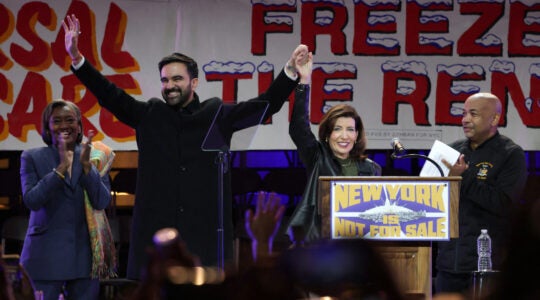Advancing two states for two peoples, a Zionist necessity, has never been more urgent. Those of us who share this vision must find concrete and effective vehicles to support its fulfillment. One way is to constantly encourage Israeli and Palestinian leaders to make progress toward peace, and to press for the United States to play an active facilitating role. Equally important, we should seek opportunities to build positive Israeli-Palestinian engagement at the grassroots level. A true and lasting peace requires genuine reconciliation between peoples, not just the signatures of leaders on treaties.
On March 20, many thousands of Jewish and non-Jewish activists from across the country will gather in our nation’s capital for the annual policy conference of AIPAC, the pro-Israel lobby. This event is truly an impressive display of political clout, which commands the attention of the international media and decision-makers on both sides of the aisle. Attendees will be there to advance AIPAC’s admirable mission – “to protect and promote the U.S.-Israel relationship in ways that enhance the security of the United States and Israel.”
The day after AIPAC’s conference concludes, some 40-45 representatives of another organization, the vastly under-resourced Alliance for Peace in the Middle East (ALLMEP), will be in Washington, DC. A coalition of more than 90 civil society organizations that engage in people-to-people encounters among Israeli Jewish and Arab citizens and Palestinians in the territories, ALLMEP will lobby Congress on behalf of continued funding for these efforts to the tune of $10 million this coming year. It also will be encouraging support for H.R. 1489, the International Fund for Israeli-Palestinian Peace Authorization Act of 2015 that, if adopted by both houses of Congress, could bring about expanded capacity in this arena.
Mainstream community groups should offer their support to ALLMEP’s legislative agenda, and we should feature these people-to-people civil society organizations in our meetings and conferences. In addition, missions to Israel, both Jewish and interfaith, will be enriched by scheduling interactions with them. At a time when stagnation in the peace process and terrorist violence are leading to despair, offering encouragement to civil society groups that are still plugging away at peaceful coexistence despite the challenges, is more important than ever. In lifting their spirits, perhaps we will also lift our own.
The American campus is a venue uniquely ripe for a more positive form of activism. Indeed, there is a desperate need for opportunities in which progressive students — that’s most of them, by the way — get to participate in constructive and non-confrontational advocacy around Israel-Palestinian peacemaking. Right now, the battles between our community and groups associated the anti-Israel BDS (boycott, divestment and sanctions) Movement, such as Students for Justice in Palestine and Jewish Voice for Peace, are dominant. By some accounts, we are spending literally tens of millions of dollars to defeat divestment resolutions and counter Israel Apartheid Weeks and other egregious forms of delegitimization and demonization.
Hillel, our community’s primary institutional vehicle on campus, is tasked with nurturing the growth of Jewish students’ engagement with their Judaism, which includes a love of Israel. Its core mission is not to defend Israel politically on campus, although national and local Hillel professionals increasingly have been drawn into the fray. Other Jewish organizations have come onto campus in recent years with approaches and messages out of sync with the sensibilities of a younger generation harboring more critical attitudes toward Israeli policies.
So where can a progressive Jewish or non-Jewish student go if he/she does not want to become embroiled in the polarizing BDS battles on campus? One possible outlet is J Street U, which has experienced a burst of growth in recent years. Even though its current president happens to be a Muslim student at the University of Maryland, the reality is that this organization is geared almost exclusively toward Jewish students.
There is a potential emerging alternative on campus, OneVoice — the flagship initiative of the PeaceWorks Foundation and “an international movement that amplifies the voice of mainstream Israelis and Palestinians, empowering them to propel their elected representatives toward the two-state solution.” The OneVoice on Campus Fellowship is experimental at this stage, small-scale, but holds enormous promise. Four regional coordinators, three Palestinians and one Jew, have begun recruiting students of all faiths and ethnic affiliations on 15 campuses in and near New York City, Chicago and Washington, D.C. to become involved in educational and advocacy programs that underscore the urgency of reaching a two-state solution through negotiation, not by means of coercive one-sided measures like BDS. The participation of Palestinians makes an important statement at this time, when calls by “anti-normalization” activists to break off contact with Israelis are growing. If successful, this fledgling program looks to become a fixture on many campuses in future academic years.
This analysis is in no way intended to devalue the critical work our community does to solidify the U.S.-Israel relationship and to defend Israel against its detractors. To the contrary, I was immersed in this enterprise professionally for more than three decades, and am pleased that it is attracting strong support and enhanced resources. I do believe, however, that we would be well served by also giving greater recognition and support, both at the community level and on the campuses, to joint Israeli and Palestinian peacemaking efforts.
Martin J. Raffel is former senior vice president at the Jewish Council for Public Affairs.
The New York Jewish Week brings you the stories behind the headlines, keeping you connected to Jewish life in New York. Help sustain the reporting you trust by donating today.




